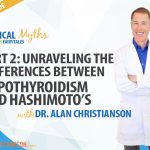4. Chronic Kidney Disease
There has been data saying that around 55% of people with hypothyroidism have abnormalities in their kidney function. It is a big deal.
What do you do? The first is to manage your hypothyroidism, with the second step being to follow up with appropriate renal care in general.
That can mean close management through a lifestyle diet, but this is a critical part of feeling well and we need to pay attention to our kidney health.
5. Cardiovascular Disease
Data suggests that those with thyroid disease carry three times the risk of heart disease. But, what do you do if you suspect that you may be struggling with your cardiovascular health?
Start by taking a closer look. Calcium scores can be helpful, follow up with a cardiologist, and be present if you suffer from any chest pains or tightness after activity.
6. Depression and Anxiety
This can be suspected when there is fatigue, unexpected pain, or a past diagnosis of mood symptoms. Studies suggest that this can be present in 69% of those with hypothyroidism.
It can also be enmeshed in ways with thyroid disease where it’s tough to distinguish the chicken from the egg. Many with thyroid disease have anxiety and depression, though.
Start with a primary care doctor and make sure that it is being addressed. There are loads of options involving diet, exercise, and other options. It really deserves your attention.
7. Diabetes and Prediabetes
We suspect this thyroid comorbidity when we see higher levels of blood sugar in various ways. Morning fasting glucose or a three-month blood sugar average.
51% of those with thyroid disease are likely to develop some version of diabetes at some point. This is something very treatable in nearly all cases.
This was the focus of my Metabolism Reset Diet. I would recommend speaking to your doctor if you have prediabetes, but consider the guidelines in the diet to help slow progression.
8. Digestion and Inflammatory Bowel Disease
If you have marked gas or bloating, don’t think that the only solution is to make your diet stricter and stricter and stricter. This can often have the opposite intended effect.
One study showed that 100% of those with hypothyroidism have disorders of gut motility, meaning that the sequence of nerve firing did not work right for them.
That is why it is great to have a thorough evaluation. IBS or IBD can be treated and managed naturally, which means consulting with a medical professional to help.










